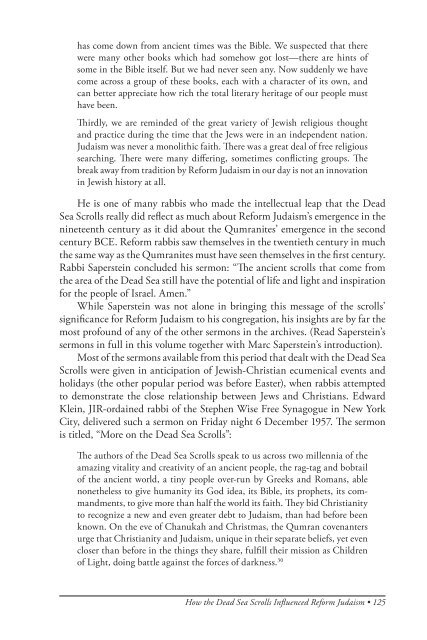The American Jewish Archives Journal, Volume LXI 2009, Number 1
The American Jewish Archives Journal, Volume LXI 2009, Number 1
The American Jewish Archives Journal, Volume LXI 2009, Number 1
Create successful ePaper yourself
Turn your PDF publications into a flip-book with our unique Google optimized e-Paper software.
has come down from ancient times was the Bible. We suspected that there<br />
were many other books which had somehow got lost—there are hints of<br />
some in the Bible itself. But we had never seen any. Now suddenly we have<br />
come across a group of these books, each with a character of its own, and<br />
can better appreciate how rich the total literary heritage of our people must<br />
have been.<br />
Thirdly, we are reminded of the great variety of <strong>Jewish</strong> religious thought<br />
and practice during the time that the Jews were in an independent nation.<br />
Judaism was never a monolithic faith. <strong>The</strong>re was a great deal of free religious<br />
searching. <strong>The</strong>re were many differing, sometimes conflicting groups. <strong>The</strong><br />
break away from tradition by Reform Judaism in our day is not an innovation<br />
in <strong>Jewish</strong> history at all.<br />
He is one of many rabbis who made the intellectual leap that the Dead<br />
Sea Scrolls really did reflect as much about Reform Judaism’s emergence in the<br />
nineteenth century as it did about the Qumranites’ emergence in the second<br />
century BCE. Reform rabbis saw themselves in the twentieth century in much<br />
the same way as the Qumranites must have seen themselves in the first century.<br />
Rabbi Saperstein concluded his sermon: “<strong>The</strong> ancient scrolls that come from<br />
the area of the Dead Sea still have the potential of life and light and inspiration<br />
for the people of Israel. Amen.”<br />
While Saperstein was not alone in bringing this message of the scrolls’<br />
significance for Reform Judaism to his congregation, his insights are by far the<br />
most profound of any of the other sermons in the archives. (Read Saperstein’s<br />
sermons in full in this volume together with Marc Saperstein’s introduction).<br />
Most of the sermons available from this period that dealt with the Dead Sea<br />
Scrolls were given in anticipation of <strong>Jewish</strong>-Christian ecumenical events and<br />
holidays (the other popular period was before Easter), when rabbis attempted<br />
to demonstrate the close relationship between Jews and Christians. Edward<br />
Klein, JIR-ordained rabbi of the Stephen Wise Free Synagogue in New York<br />
City, delivered such a sermon on Friday night 6 December 1957. <strong>The</strong> sermon<br />
is titled, “More on the Dead Sea Scrolls”:<br />
<strong>The</strong> authors of the Dead Sea Scrolls speak to us across two millennia of the<br />
amazing vitality and creativity of an ancient people, the rag-tag and bobtail<br />
of the ancient world, a tiny people over-run by Greeks and Romans, able<br />
nonetheless to give humanity its God idea, its Bible, its prophets, its commandments,<br />
to give more than half the world its faith. <strong>The</strong>y bid Christianity<br />
to recognize a new and even greater debt to Judaism, than had before been<br />
known. On the eve of Chanukah and Christmas, the Qumran covenanters<br />
urge that Christianity and Judaism, unique in their separate beliefs, yet even<br />
closer than before in the things they share, fulfill their mission as Children<br />
of Light, doing battle against the forces of darkness. 30<br />
How the Dead Sea Scrolls Influenced Reform Judaism • 125

















